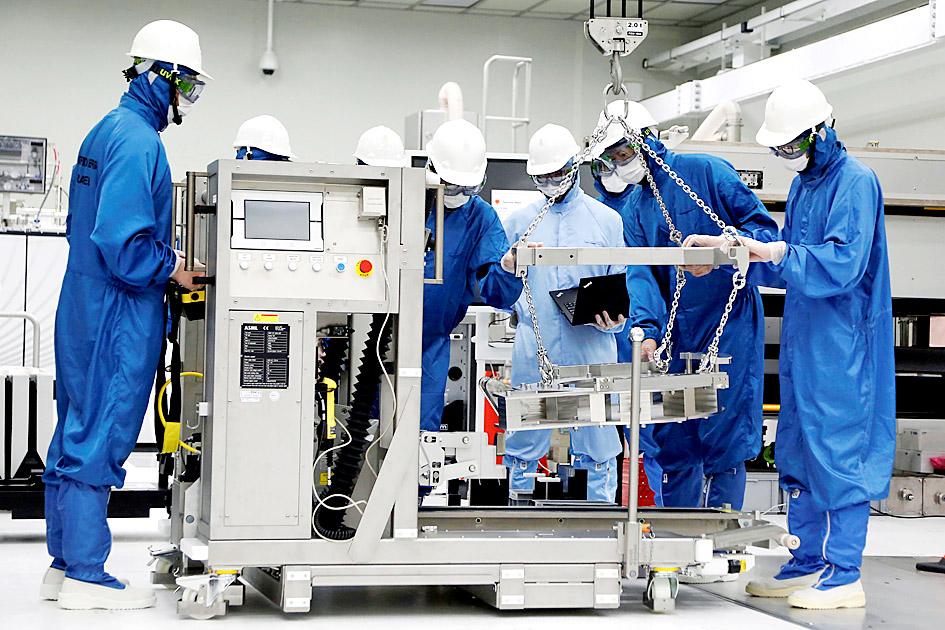Dutch microchip machine maker ASML Holding NV yesterday reported better-than-expected third-quarter sales, with the tech sector still fueling demand despite the COVID-19 pandemic.
The company is the world’s leading provider of systems used by the semiconductor industry to manufacture the chips that go in products from mobile phones to cars, and its performance is seen as a bellwether for the information technology industry.
“We have seen no major disruptions due to COVID-19 during the last quarter,” ASML president Peter Wennink said in an earnings statement.

Photo: Reuters
Sales rose 33 percent from the same quarter last year to 4 billion euros (US$4.7 billion) — which Wennink said was “above our guidance” — and 19 percent from the second quarter.
Net profit also rose 69 percent to 1.1 billion euros from last year and 41 percent from the second quarter.
The company shipped 10 of its top-level extreme ultraviolet (EUV) machines, its top-end product used to print chips for mobile phones and computers, Wennink said.
The machines, which cost about 120 million euros each, make it possible to produce smaller, faster and higher capacity microprocessors.
ASML forecasts sales to be slightly lower in the fourth quarter at between 3.6 billion and 3.8 billion euros, but said that would confirm its outlook for the whole of this year.
Wennink said the company expects “low double-digit growth” next year.
“There are of course uncertainties due to the macro environment, including the economic impact of COVID-19 and geopolitical developments,” he said.
However, the tech factors driving ASML’s growth, such as the 5G network that Apple Inc’s new iPhones will rely on, are “still in place” and would “fuel demand,” he said.

Semiconductor shares in China surged yesterday after Reuters reported the US had ordered chipmaking giant Taiwan Semiconductor Manufacturing Co (TSMC, 台積電) to halt shipments of advanced chips to Chinese customers, which investors believe could accelerate Beijing’s self-reliance efforts. TSMC yesterday started to suspend shipments of certain sophisticated chips to some Chinese clients after receiving a letter from the US Department of Commerce imposing export restrictions on those products, Reuters reported on Sunday, citing an unnamed source. The US imposed export restrictions on TSMC’s 7-nanometer or more advanced designs, Reuters reported. Investors figured that would encourage authorities to support China’s industry and bought shares

FLEXIBLE: Taiwan can develop its own ground station equipment, and has highly competitive manufacturers and suppliers with diversified production, the MOEA said The Ministry of Economic Affairs (MOEA) yesterday disputed reports that suppliers to US-based Space Exploration Technologies Corp (SpaceX) had been asked to move production out of Taiwan. Reuters had reported on Tuesday last week that Elon Musk-owned SpaceX had asked their manufacturers to produce outside of Taiwan given geopolitical risks and that at least one Taiwanese supplier had been pushed to relocate production to Vietnam. SpaceX’s requests place a renewed focus on the contentious relationship Musk has had with Taiwan, especially after he said last year that Taiwan is an “integral part” of China, sparking sharp criticism from Taiwanese authorities. The ministry said

US President Joe Biden’s administration is racing to complete CHIPS and Science Act agreements with companies such as Intel Corp and Samsung Electronics Co, aiming to shore up one of its signature initiatives before US president-elect Donald Trump enters the White House. The US Department of Commerce has allocated more than 90 percent of the US$39 billion in grants under the act, a landmark law enacted in 2022 designed to rebuild the domestic chip industry. However, the agency has only announced one binding agreement so far. The next two months would prove critical for more than 20 companies still in the process

CHANGING JAPAN: Nvidia-powered AI services over cellular networks ‘will result in an artificial intelligence grid that runs across Japan,’ Nvidia’s Jensen Huang said Softbank Group Corp would be the first to build a supercomputer with chips using Nvidia Corp’s new Blackwell design, a demonstration of the Japanese company’s ambitions to catch up on artificial intelligence (AI). The group’s telecom unit, Softbank Corp, plans to build Japan’s most powerful AI supercomputer to support local services, it said. That computer would be based on Nvidia’s DGX B200 product, which combines computer processors with so-called AI accelerator chips. A follow-up effort will feature Grace Blackwell, a more advanced version, the company said. The announcement indicates that Softbank Group, which until early 2019 owned 4.9 percent of Nvidia, has secured a